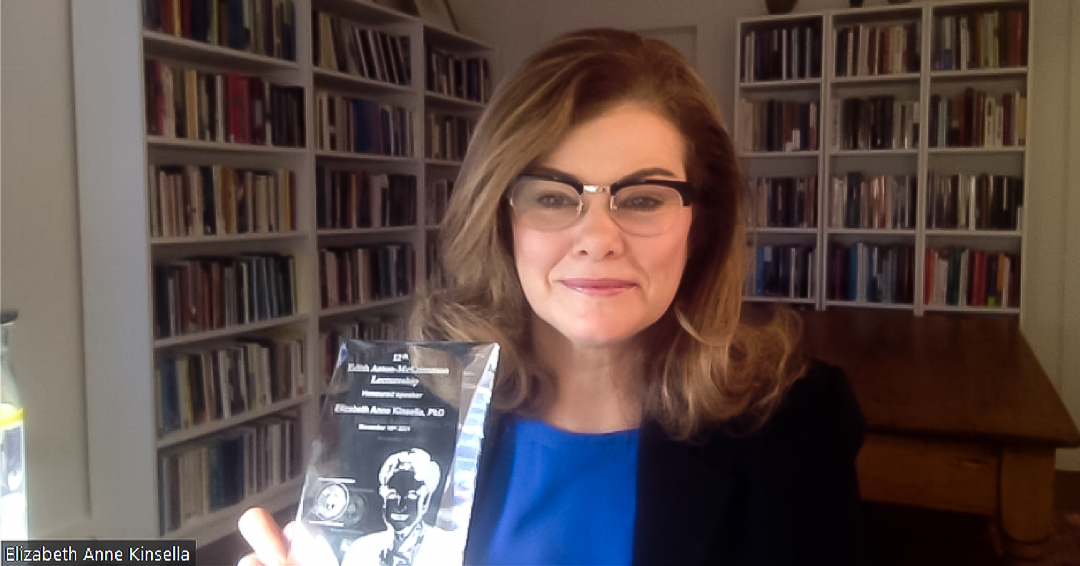
Elizabeth Anne Kinsella, newly appointed Director of the Institute of Health Sciences Education, delivered SPOT’s annual Edith Aston-McCrimmon Lecture
The School of Physical & Occupational Therapy (SPOT) was honoured to host Elizabeth Anne Kinsella, BSc(OT), MAdEd, PhD, Director of McGill’s Institute of Health Sciences Education and Associate Member of SPOT, who delivered the 2021 special Bicentennial edition of its annual Edith Aston-McCrimmon Lecture on November 18. Normally held at McGill’s Faculty Club, the lecture was once again delivered virtually, with around 100 attendees from the local and international rehabilitation community.
Kinsella has been an education scholar, occupational therapist, and mindfulness practitioner for over two decades, and highlights the importance that various reflective approaches have in improving and transforming professional education, practice, and knowledge. She draws attention to how processes of reflection can deepen practitioners’ awareness, build practice-based knowledge, and contribute to competent, ethical and wise practice. In this lectureship, Kinsella focused on one line of work in her lab, funded by the Social Sciences and Humanities Research Council of Canada (SSHRC): mindfulness education and practice in the health professions.
Using the metaphor of a tsunami, Kinsella highlighted the workplace stressors that threaten to overwhelm health care practitioners, and how these have been amplified by the pandemic. Contributing factors include heavy workloads, workforce shortages, complex job environments, discrepancies between demands and resources, technological changes, rapid changes in guidelines, constantly shifting policies, stigmatizing attitudes, microaggressions, as well as ethical challenges. These factors can impact the health and wellbeing of health care practitioners.
Kinsella argues that mindfulness can help mitigate these stresses. Mindfulness practices have become much more popular recently, with research publications growing from a handful of publications in the 1980s to over a thousand publications per year in recent years.
Mindfulness practices have the potential to help practitioners view stressful dimensions of life and clinical practice with greater clarity, said Kinsella, allowing more effective and considered responses. She explained that mindfulness interventions used in the education of health care practitioners typically involve a combination of three or four practices such as meditation, body scan, attention to breathing and mindful movement.1 Descriptions of mindfulness also frequently draw on attitudinal qualities such as, non-judgment, patience, beginner’s mind, trust, non-striving, acceptance, and letting go.2 Kinsella noted that a mindful approach can also be beneficial for patient-centred care by cultivating presence and compassion in the therapist and patient relationship.
A recent study Kinsella conducted on mindfulness education that asked rehabilitation students to keep a mindfulness journal revealed the power of mindfulness to help a person transform their perspective and find new ways of looking at stressful events. Kinsella read out a journal entry from one of the students which described one such realization:
I had recognized in myself, for some time, a super-charged tendency to worry about the future, to dwell in hypotheticals, and to over-scrutinize my own performance…I recognized this habit, and the stifling anxiety that it produced, but couldn’t seem to do anything about it. I tried to tell myself to ‘just relax’, but this felt impossible. Mindfulness offered a new suggestion: a method not for stopping worry, but for cultivating its opposite ̶ the direct practice of dwelling non-judgmentally in the present moment… I seemed calmer, clearer, and better able to react to challenging situations.
Kinsella also discussed how mindfulness can occur while engaging in an activity with full attention and presence, as a kind of ‘being while doing.’ Her team is looking at the potential of ‘mindful occupation’ as a way of rethinking how mindful attention can be brought to everyday ‘occupations’ (defined as all that people need, want, or are required to do).3 An overlooked aspect of mindfulness education, says Kinsella, is the struggle that new learners experience, and the importance of normalizing that struggle with those new to this practice. She also spoke about how mindfulness can foster compassion in students, both for themselves and for those with whom they work, and how important it is to find a supportive mindfulness community.
Teaching mindfulness to practitioners within systems that create conditions of stress isn’t enough, says Kinsella. Institutions have a responsibility to design systems that support the health and well-being of practitioners and patients. Steps toward supporting individuals to manage workplace stress must be combined with positive systemic change within organizations.
Mindfulness also has a place in work for equity, diversity, inclusion and justice, said Kinsella. Proponents argue that mindfulness practices can offer a firm ground from which to encounter personal and professional difficulties, and can help us to pause in order to create a thoughtful response to situations of injustice, assist us to understand the responses of others, and help build tolerance and compassion.4
Kinsella concluded that while it’s not a panacea, cultivating awareness through mindfulness practices may be helpful in refining wisdom and fostering resilience among students and practitioners in health care professions.
It was an honour to hear such a respected researcher discuss emerging research on mindfulness education and practice, and how mindfulness has the potential to be of assistance in managing the stresses of health care practice, especially in these pandemic times.
___________________________________________________________________________
1) Kinsella, Smith, Bhanji et al. (2020). Mindfulness in allied health and social care professional education: a scoping review. Disability and rehabilitation, 42(2),283-295.
(2) Kabat-Zinn, J. (2013). Full catastrophe living: Using the wisdom of your body and mind to face stress, pain and illness. New York: Bantam Books.
(3) Goodman, Wardrope, Myers, et al. (2019). Mindfulness and human occupation: a scoping review. Scandinavian Journal of Occupational Therapy. 26(3),157-170.
(4) Berila, B. (2016). Integrating mindfulness into anti-oppressive pedagogy: Social justice in higher education. New York: Routledge.

